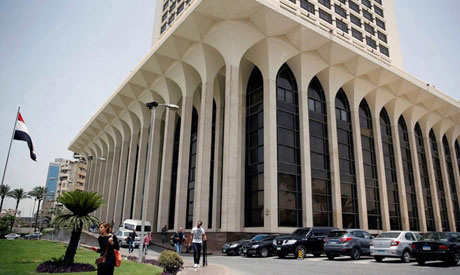
File Photo: The Egyptian Foreign Ministry in Cairo (Photo: Reuters)
Egypt’s foreign ministry has criticised a statement from Ethiopia on the collapse of the latest negotiations on the disputed Grand Ethiopian Renaissance Dam (GERD), describing it as “deliberately misleading” and “distorting the facts.”
In a statement released on Friday, the Egyptian ministry said the last four trilateral meetings between the irrigation ministers of Egypt, Ethiopia and Sudan have not led to significant progress in talks, due to Ethiopia’s intransigence.
On Thursday, Addis Ababa said that no agreement had been reached on the filling and operation of the mega-dam, including on the volume of minimum release from the GERD and cooperation during drought and prolonged drought.
It accused Egypt of trying to reinforce “self-claimed sole ownership of the Nile waters” with a “proposal of filling in 12-21 years” and obliging Ethiopia to compensate for “the cumulative deficit” for the water it uses for dam filling.
The Egyptian foreign ministry said that such statements do not help in creating a favourable environment for progress in talks.
The statement presents an “unrealistic image” of negotiations and Egypt’s stances and technical proposals in the meetings over the past few months, the Cairo statement said.
Egypt said it has not requested the filling take 12-21 years, and has not specified the filling time.
“The three countries agreed more than a year ago that the filling of the dam would take place in stages, depending on the Blue Nile’s yearly flow,” it said.
It said the Egyptian proposal depends on filling the dam over a period of six or seven years, if the Blue Nile’s flow is average or above average during the filling period.
“In the case of drought, the Egyptian proposal will allow the GERD to generate 80 percent of its production capacity of electricity, which means that the Ethiopian side will bear a minor drought burden,” the statement by the Egyptian ministry said.
Ethiopia had described Egypt’s proposal as one which “assumes natural flow on the Blue Nile River, which zeroes all abstractions including the existing water development projects Ethiopia built for the past 50 years on the Blue Nile.”
Egypt said it was ‘surprised’ by Ethiopia suggesting readiness to fill the GERD unilaterally every time Cairo stressed the necessity of agreeing on effective steps to deal with possible drought years during the filling process.
The foreign ministry added that last four ministerial meetings have not led to significant progress in talks due to Ethiopia’s “intransigence and its intention to impose reality and extend control of the Blue Nile and the filling and operations of the GERD, regardless of downstream countries’ water interests.”
“Such an action violates Ethiopia’s legislative commitments under international accords, including March 23 2015’s Declaration of Principles, the Anglo-Ethiopian Treaty of 1902 which it conducted as an independent state, and the Cairo Cooperation Framework of July 1993 [where both countries pledged not to implement water projects harmful to the interests of the other],” it said.
Egypt said it will participate in the upcoming meeting hosted by Washington on 13 and 14 January with the US treasury secretary and the foreign and water ministers of the three countries.
The participation comes under its commitment to honest work to reach a fair and balanced agreement and efforts to preserve the Egyptian people’s interests, which it described as “uncompromisable.”
If the dispute is not resolved by 15 January, an international mediator will be appointed to help resolve it, according to the deal the countries reached in Washington last year.
Ethiopia hopes that the $4.8 billion GERD mega-dam, which has been under construction since 2011, will allow it to become Africa’s biggest power exporter.
Short link: